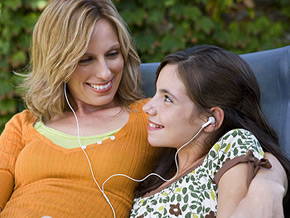How to Talk to Your Daughter About Her Weight

When it comes to food choices and weight, few of us are comfortable talking. With teenage girls, the challenge grows larger—how do you create engaging, productive conversations without causing a fight?
We're all familiar with the saying "an ounce of prevention is worth a pound of cure." And this is precisely what Michelle Obama advocated for in her response to the surgeon general's report citing childhood obesity rates as a public health crisis in the United States. As a healthcare provider to teen girls, I couldn't agree more. The United States needs a real shake-up when it comes to preventing obesity in kids, and more power to the first lady for taking this on as her cause.Many of my teen patients are obese and completely oblivious to it. I am not talking about a curvaceous and active young beauty who enjoys food as much as an active lifestyle. Those girls have the right formula. The teens I'm referring to are the ones who only drink soda, are almost completely unfamiliar with vegetables and think of walking to the kitchen as exercise. And when I meet their parents, who are often twice as obese and show up late because they were looking for the closest possible parking place, it becomes clear to me why my words of wisdom regarding healthy living sound like Martian to the teens!
As the CEOs of households, mothers are in a great position to set good examples about diet and exercise while also allowing their teens choices about what and how they eat. It might be tempting for mothers to make all the decisions about what groceries to buy, but this won't help girls learn to make sound choices on their own. Teens need opportunities to make their own decisions with guidance from mothers who are better informed about what's in their kids' best interest.
Even if your daughter understands that nutritious foods are good for her, don't be surprised if she tells you that blueberry Pop-Tarts provide a serving of fruit and corn chips are a vegetable. Remember, her frontal lobe isn't fully formed. Let your superior knowledge about what's nutritious lead her in the right direction. Here are some recommendations:
- Before going to the grocery store, ask your teen for her contributions to the shopping list with the caveat that her requests need to be nutritious, except for one junk item, if she so desires. And don't edit this request. No matter how bad her choice seems, it's important for her to be able to make choices without your interference. Then, buy a limited amount, and once it's gone, don't replace it for a week.
- Don't harp on her choices. If you discover that she's spent her allowance at your local fast food restaurant, don't tell her a million times that her double cheeseburger will clog her arteries. She won't listen and she'll endlessly remind you of your dietary indiscretions.
- Help her strike a balance between sedentary and physical activities. Insist that she participates in one physical activity or sport each semester, and don't buy her a television for her room if she can't self-limit.
- Make sure you practice what you preach and that she sees you doing so. Skip the chips and make a healthy snack. Find a weekly physical routine that you enjoy and stick to it. If you make healthy living a part of your life, your daughter will be more likely to pick it up. While it may seem like your teen looks down her nose at everything you do, you'd be surprised how much she's actually taking in.

- Be mindful of your comments about your own body and health. If you refer to yourself as a fat sloth, your daughter will pick up this outlook. Treat your body respectfully, and the contagious nature of positive thinking will be good for both of you.
- And you can always get her the puppy she's wanted. Is it really so bad if you end up walking it every day? It actually sounds like a good exercise plan! Plus, the puppy will love you no matter what. This is an excellent counterpoint to your daughter telling you that you're the worst person who's ever walked the earth—which you can expect while she's a teen. Consider a puppy an investment in your mental health.
Our first lady has the right idea. And if anyone thinks she was too personal when she talked about her own kid's BMIs, let's not overreact. Michelle Obama is just one of many concerned mothers who would like to help her children avoid the problems associated with obesity. The teasing all by itself can make life a living hell, affecting a child's emotional health for the worse. Add to this the dramatic increase in health risks, and you're looking at a real mess and what often ends up being a lifelong battle that gets harder to manage with age. I say a round of applause for the first lady, and may her ounce of prevention platform become nice and sturdy for the benefit of American kids!
Evelyn Resh is director of sexuality and relationships programming for Miraval Resorts in Tucson. She is a certified sexuality counselor and nurse-midwife and continues her practice in both fields in Tucson and western Massachusetts. She has taken care of teens and women of all ages in the OB-GYN and primary care settings for more than 20 years and specializes in working with women 25 and under. She is also the mother of a 19-year-old daughter. Evelyn speaks all over the nation on topics related to women's health and sexual satisfaction and is the author of the new book The Secret Lives of Teen Girls: What Your Mother Wouldn't Talk About but Your Daughter Needs to Know published by Hay House Publishers.
The opinions expressed by Oprah.com contributors are strictly their own.



